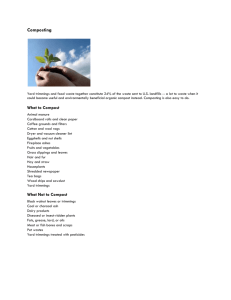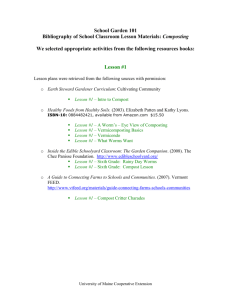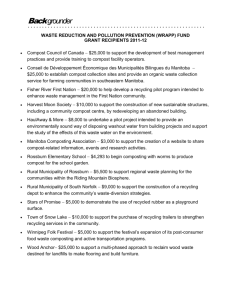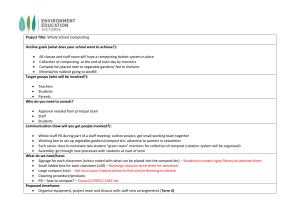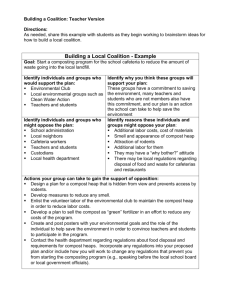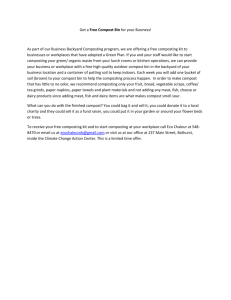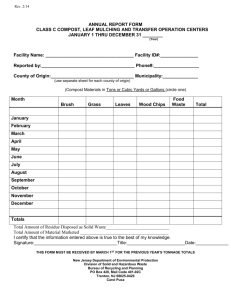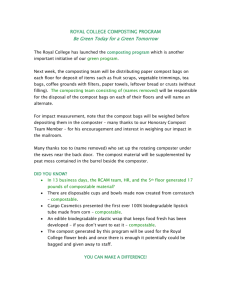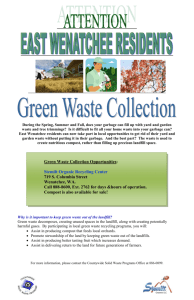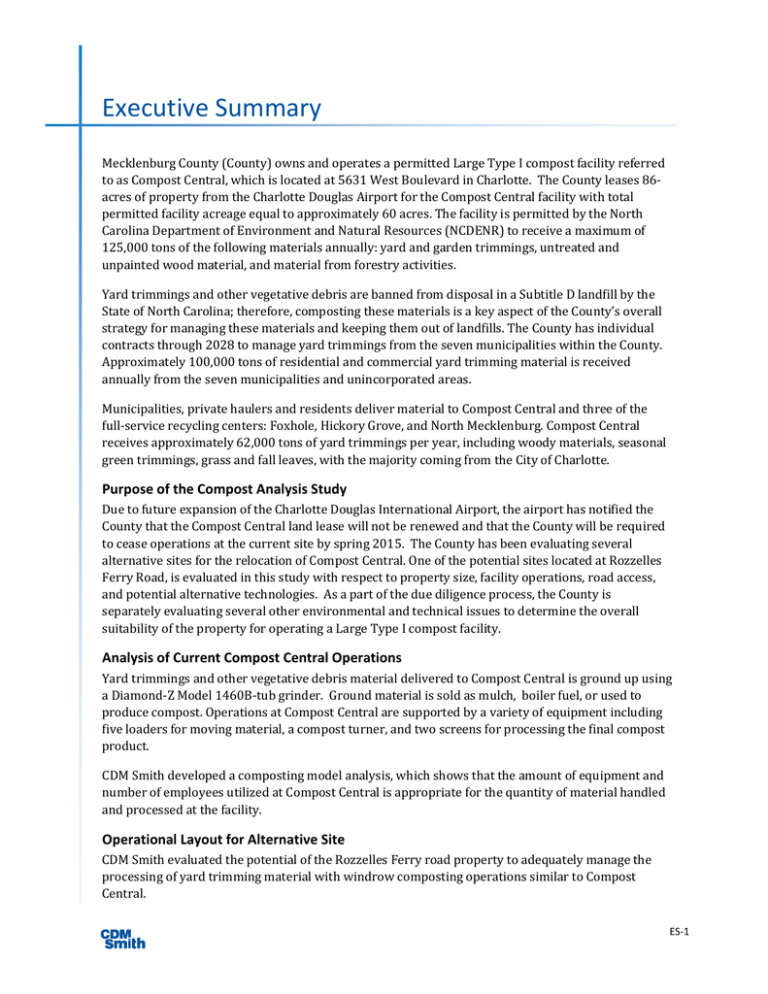
Executive Summary
Mecklenburg County (County) owns and operates a permitted Large Type I compost facility referred
to as Compost Central, which is located at 5631 West Boulevard in Charlotte. The County leases 86acres of property from the Charlotte Douglas Airport for the Compost Central facility with total
permitted facility acreage equal to approximately 60 acres. The facility is permitted by the North
Carolina Department of Environment and Natural Resources (NCDENR) to receive a maximum of
125,000 tons of the following materials annually: yard and garden trimmings, untreated and
unpainted wood material, and material from forestry activities.
Yard trimmings and other vegetative debris are banned from disposal in a Subtitle D landfill by the
State of North Carolina; therefore, composting these materials is a key aspect of the County’s overall
strategy for managing these materials and keeping them out of landfills. The County has individual
contracts through 2028 to manage yard trimmings from the seven municipalities within the County.
Approximately 100,000 tons of residential and commercial yard trimming material is received
annually from the seven municipalities and unincorporated areas.
Municipalities, private haulers and residents deliver material to Compost Central and three of the
full-service recycling centers: Foxhole, Hickory Grove, and North Mecklenburg. Compost Central
receives approximately 62,000 tons of yard trimmings per year, including woody materials, seasonal
green trimmings, grass and fall leaves, with the majority coming from the City of Charlotte.
Purpose of the Compost Analysis Study
Due to future expansion of the Charlotte Douglas International Airport, the airport has notified the
County that the Compost Central land lease will not be renewed and that the County will be required
to cease operations at the current site by spring 2015. The County has been evaluating several
alternative sites for the relocation of Compost Central. One of the potential sites located at Rozzelles
Ferry Road, is evaluated in this study with respect to property size, facility operations, road access,
and potential alternative technologies. As a part of the due diligence process, the County is
separately evaluating several other environmental and technical issues to determine the overall
suitability of the property for operating a Large Type I compost facility.
Analysis of Current Compost Central Operations
Yard trimmings and other vegetative debris material delivered to Compost Central is ground up using
a Diamond-Z Model 1460B-tub grinder. Ground material is sold as mulch, boiler fuel, or used to
produce compost. Operations at Compost Central are supported by a variety of equipment including
five loaders for moving material, a compost turner, and two screens for processing the final compost
product.
CDM Smith developed a composting model analysis, which shows that the amount of equipment and
number of employees utilized at Compost Central is appropriate for the quantity of material handled
and processed at the facility.
Operational Layout for Alternative Site
CDM Smith evaluated the potential of the Rozzelles Ferry road property to adequately manage the
processing of yard trimming material with windrow composting operations similar to Compost
Central.
ES-1
Executive Summary
Figure ES-1 shows a conceptual layout, for windrow composting, superimposed on the Rozzelles
Ferry Road site. This conceptual operation is equal in size to the current operation at Compost
Central, and would provide efficient composting operations. With some site grading, stormwater can
be effectively managed on this property. The property location would allow separate entrance and
exit points with one-way traffic entering from Valleydale Road and exiting onto Rozzelles Ferry Rd.
Alternative Composting Technologies
The turned windrow operation at Compost Central is simple and highly efficient for composting of
yard trimmings and vegetative debris. CDM Smith evaluated alternative composting equipment and
processes that might be considered to meet specific site constraints or to process additional organic
waste materials. The following are alternative composting processes considered: side discharge
windrow turner; aerated static pile; aerated block turning; tunnel composting; and anaerobic
digestion.
For most Large Type I composting facilities, operators utilize turned windrows for producing
compost. The alternative methods described above are considered physically viable for the Rozzelles
Ferry road site; however, they require higher levels of capital investment and would be more costeffective or appropriate for operations that involve processing non-vegetative organic materials such
as food waste, agricultural waste, and source-separated specialty wastes. Since the County is only
considering processing yard trimmings at this time, these alternative technologies are not considered
appropriate options for a County Type I compost facility, but can be re-evaluated in the future.
Availability of Alternative Public and Private Facilities
Eight permitted Large Type I compost facilities, including Compost Central, are located within 100
miles of Charlotte based on NCDENR information. Local government entities own and operate six of
the facilities while the remaining two are privately owned and operated. The six public facilities,
located in the following cities: Hickory, Winston-Salem, Gastonia, and High Point, utilize their limited
capacities to serve their jurisdictions and do not appear to have sufficient capacity to accept
materials from the County. Therefore, the availability of alternative facilities is limited to the private
sector composting market.
The existing capacity at Wallace Farms and Earth Farms may be sufficient to handle a majority of the
material received at Compost Central; however, the remaining capacity within the County would be
exhausted which could limit the ability to manage storm debris or the growth in the generation of
vegetative debris as the County’ population grows and economic recovery continues into the future.
This initial review of the available compost capacity proximate to the County indicates that the
current private market capacity may be insufficient to serve the County’s long-term composting
needs.
Public/Private Partnerships
Public sector solid waste departments or authorities frequently form public/private partnerships
(PPP) with private sector vendors and operators for the following reasons: draw upon more
specialized skills and expertise, especially for relatively complex operations; minimize public sector
capital borrowing or capital at risk; and, build a broader revenue base through additional users.
ES-2
• Executive Summary
PPP agreements are structured in a variety of ways such as contract operations,
design/build/operate (DBO) contracts, and as a host community for a design/build/own/operate
(DBOO) contract. The most widespread partnership structure is an operations contract between a
public sector facility and a private contract operator
The Compost Central operations are relatively straightforward, and the productivity analysis
presented in this report concludes that equipment and personnel are utilized efficiently. Therefore,
the use of contract operations does not appear to provide any clear benefits for the County.
The DBO and DBOO approaches do not appear to offer any specific advantages for the County’s
composting operation. If a more complex mechanized food waste composting or anaerobic digestion
process is considered in the future, a DBO or DBOO approach could offer more potential advantages.
Summary
The Compost Central operation is appropriately staffed and equipped to handle the amount of
material processed at the facility. The current windrow composting approach is an efficient and costeffective method for processing yard trimmings and other vegetative debris materials. The turned
windrow process also provides a high degree of flexibility in handling the seasonal variations in
woody materials, yard trimmings, and fall leaves collection.
The Rozzelles Ferry Road site is large enough to accommodate an operation similar to Compost
Central and, with some grading, can be designed to capture and treat all contact runoff. The site is
also large enough to accommodate any process modifications and expanded capacity in the future.
The primary items to be addressed regarding the use of the Rozzelles Ferry Road site are related to
attenuating any environmental impacts on nearby residential homes, especially to the north.
The Rozzelles Ferry Road site will allow the County to continue providing leadership and
environmental stewardship regarding the management of yard waste and other vegetative debris
generated within the county. In addition, the facility would continue to provide the County with the
ability to effectively manage storm debris especially during the initial surge of materials collected to
clear access for critical emergency, utility, and local government responses.
ES-3
© 201ϯ CDM Smith
All Rights Reserved
Figure ES-1
Windrow Composting

